On the Day of the African Child, marked today, Interpeace joins the African Union, governments, civil society, the international community, and other stakeholders to reflect on the cycle of injustice and exclusion that children face in Africa.
The Day of the African Child is observed every year on June 16. It was first initiated in 1991 by the Organization of African Unity, now the African Union (AU). This year, 2020, the day is held under the theme “Access to Child-Friendly Justice System in Africa”.
Children in Africa are particularly vulnerable to falling behind in the global development agenda as laid out by the Nations Unies, in the Sustainable Development Goals (SDGs). While there has been significant progress in parts of the continent to advance children’s rights, children growing up in fragile societies or areas affected by violent conflict continue to face inequality, violence, and injustice.
The Day of the African Child is being commemorated this year in the context of the Black Lives Matter protests in the United States of America and the wider fight for equality and justice for all globally. This period of social unrest is fanned by shared rage and distress of black people and descendants of enslaved Africans brought to the English colonies over 400 years ago. The protests, some of which have turned violent, have exposed entrenched systems of injustice and exclusion in societies around the world – and are a stark reminder for everyone to fight inequality and injustice at all times, everywhere, and at different levels.
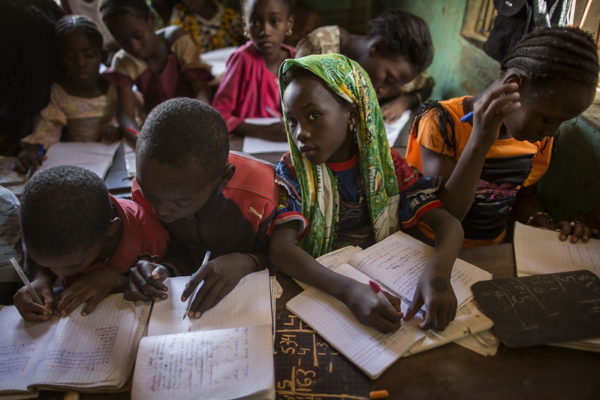
Photo credits: UN - Marco Dormino
Addressing exclusion of children in Guinea Bissau’s traditional justice systems
Interpeace works with local and international partners, and governments across Africa to achieve the SDG targets with the greatest impact for everyone, including children and young people. In line with SDG Goal 10 - to reduce inequality within and among countries, and Goal 16 – to promote peaceful and inclusive societies, Interpeace implemented a project on traditional justice and youth in Guinea Bissau. Through this project, Interpeace and its local partner Voz di Paz provided informed technical support to UNDP et un UNICEF to support more inclusive traditional justice systems for children and women in Guinea Bissau.
“We rarely take our problems to traditional leaders. We look for the child’s family, because when a child has a problem, traditional leaders do not listen to him/her, only their father is heard, which is wrong because the child can contribute ideas about the problems that concern her/him,” explained Eliezer Monteiro, a young participant in the project from Guinea Bissau’s Children’s Parliament.
Funded by the Peacebuilding Fund (PBF), the project successfully carried out a study on how traditional justice mechanisms or alternative dispute resolution mechanisms operate in the country, with a focus on how women and children are treated by traditional justice systems.
“The child can never be right, in a conflict s/he is involved in, especially if it is a conflict between a child and his or her own parents. For us, a child is a child, s/he has no thoughts,” said Lamine Camará, a Traditional Leader.
The project effectively engaged traditional leaders, members of the community, women and young people from the Children’s Parliament in Guinea Bissau’s three regions of Oio, Gabú and Tombali, to tackle exclusion and injustice that women and young people face in their traditional justice systems.
The communities have become more inclusive to give access and allow meaningful participation for women and children in their traditional justice systems.
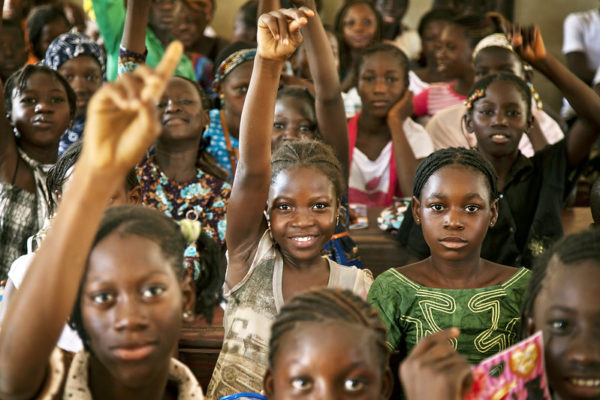
Photo credits: UN - Marco Dormino
Supporting integration of Islamic school children in Côte d'Ivoire
Côte d’Ivoire, a country in West Africa, has 1.6 million children not learning in its formal education system. At least 237,000 of them study in local Islamic education structures not recognized by the state. The content of education from these local Islamic schools does not equip children with the skills required to succeed professionally in future, and the certificates obtained, if at all, are not recognized.
“Talibés” - an Arabic word for pupils, have experienced some form of social injustice in the Ivorian society due to the “religious-only” education they receive, which generally gives them access to only a few livelihood opportunities in the informal sector only.
To ensure that all children get access to the state-recognized education curricula and equal access to opportunities, the government of Côte d'Ivoire is working to integrate non-recognized Islamic schools or their pupils into the formal education system.
In 2017, Interpeace and its partner in the country, Indigo Côte d’Ivoire, supported the Ivorian government’s efforts by working with the National Education Ministry to conduct a Participatory Action Research (PAR) on traditional Quranic schools and the talibé children. The research, financed by UNICEF and the European Union (EU), provided important data and recommendations that influenced the Ministry’s strategic and inclusive integration approach.
Interpeace and Indigo Côte d’Ivoire have continued to bring their technical and policy-oriented support to the Ministry within the framework of the development and currently, the implementation of its national strategy on the integration of Islamic school pupils into the formal education system. This contribution will offer greater social and economic integration opportunities to these children in the future, thus allowing them to enjoy equal opportunities with other Ivoirian children. It also supports efforts by the international community to combat child labour and build lasting peace in Africa’s Sahel region, as well as, contribute significantly to SDG Goal 4 that seeks to ensure quality education for all.
Additionally, in October 2019, Interpeace organized the Peace Talks, for the second time in Africa. The PeaceTalks is a global initiative which builds on the idea that everyone can play a part in building peace. Held for the first time in West Africa, the Abidjan Peace Talks organized by Interpeace in Côte d’Ivoire was part of a three-day public event named “Youth for Peace Côte d’Ivoire”. It aimed to create an inclusive platform for young Ivorians to dialogue with decision makers and amongst themselves, as young peacebuilders, and share innovative ideas that contribute to sustainable peace in the country.
“More than just an event, "Youth for Peace Côte d’Ivoire” was the symbol of young people committed to peace in Côte d'Ivoire. We don't talk enough about these young people, but their stories inspire everyone," said Mathilde Boddaert, Interpeace’s Senior Programme Manager in Côte d'Ivoire.
“Youth for Peace Côte d’Ivoire” created an opportunity for young Ivorians to speak up against exclusion and the injustices they face in their communities, including the common stigma of youth as perpetrators of violence.
The Day of the African Child is observed in memory of a June 16th students’ uprising in Soweto, South Africa in 1976. The day celebrates the brave action of these children who marched to protest poor quality education, in defense of their right.
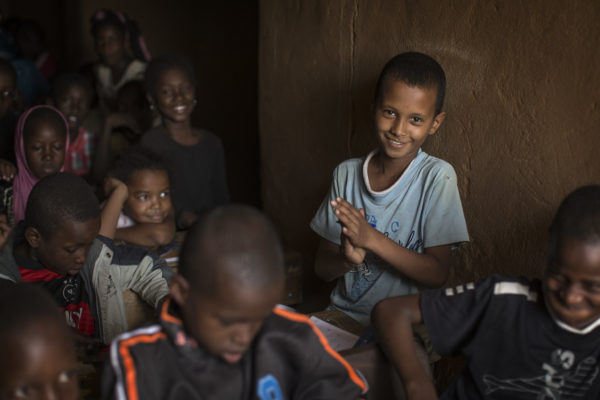
Photo credits: UN - Marco Dormino
Interpeace is delighted to announce the launch of the first international Peace Responsiveness Facility in June 2020. The Facility will provide expert advice and develop practical field work with international organizations – including UN bodies such as the FAO, Qui, UNICEF and others – to ensure that future development and humanitarian policy, as well as field activities worldwide, are better equipped to identify conflict risks and to contribute to long-term peace.
After successfully trialing ‘peace responsiveness’ from 2017 to 2020 with several specialized agencies, as well as practical fieldwork in the Democratic Republic of Congo and Somalia, the concept is now being scaled-up to a full Facility which is funded for the next three years.
Despite the fact that over 80% of humanitarian and development work is carried out in contexts of violent conflict, many organizations acknowledge that their actions are insufficiently adapted to those complexities. As a result, humanitarian and development interventions in such settings are less sustainable and miss crucial opportunities to contribute to peace and ending need.
To assist international organizations in seizing those opportunities, Interpeace has launched its Peace Responsiveness Facility (PRF). The Facility supports organizations operating in conflict-affected or fragile settings in designing and implementing programmes that not only achieve technical outcomes such as food security and health interventions among others, but that contribute to enhancing peace at the same time.
“COVID-19 has made it even more urgent for development, humanitarian and peacebuilding organizations to work together, mitigate critical humanitarian needs and address pressing underlying conflicts. The Peace Responsiveness Facility will support translating this way of working into practice,” said Scott Weber, President of Interpeace.
The Facility, which Interpeace has piloted for years, will play a vital role in facilitating learning on how the COVID-19 pandemic interacts with peace and conflict dynamics as well as providing policy and programmatic guidance for peace responsive COVID-19 interventions.
“COVID-19 is affecting relationships in communities as well as between communities and governments and we need to plan together with international organizations, a peace responsive approach mitigating these effects,” said Martina Zapf, Senior Manager at Interpeace.
Peace responsiveness is an approach to the Humanitarian-Development-Peace Nexus enabling all interventions undertaken within different sub-sectors to ultimately contribute to social cohesion and trust in state-society relationships.
The Facility will involve joint programmatic efforts on the ground, with Interpeace and partner organizations working together for locally owned, sustainable, and peace-oriented humanitarian and development activities.
“Interpeace’s role is to assist the international community – especially the UN – to improve peacebuilding through its innovative thought leadership, and to deliver practical peacebuilding on the ground. We had achieved a proof of concept that ‘peace responsiveness’ works, and the new Facility will now create lasting change in the international system and in people’s lives,” Scott Weber added.
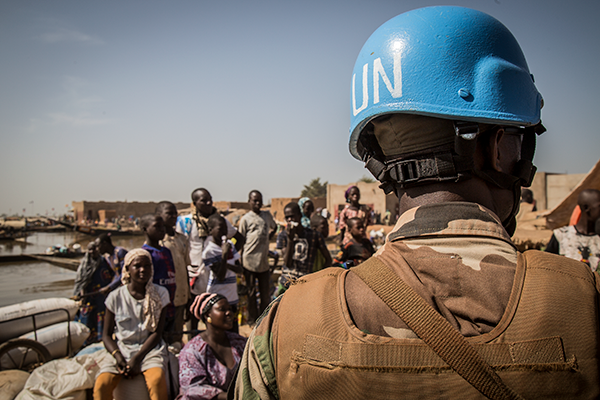
Photo credits: UN Photo/Gema Cortes
The Peace Responsiveness Facility will develop new partnerships and also build on Interpeace’s previous and current work with partners such as the Food and Agriculture Organization (FAO)la International Federation of Red Cross and Red Crescent Societies (IFRC), International Labor Organization (ILO)la Peacebuilding Support Office (PBSO)la United Nations Children’s Agency (UNICEF)et World Health Organization (WHO).
“We are starting to see the impact our peace responsive work can have. Our work with FAO and other partners is testimony,” said Martina Zapf. “Interpeace has worked with agencies like the FAO to identify good practices and put in place methods that enable programmes to systematically identify and seize opportunities to contribute to peace,” she explained.
The facility supports humanitarian, development, and stabilization organizations to play a more effective role in also supporting peace efforts around the world.
“As the current chair of the UN Peacebuilding Commission and a candidate for the UN Security Council in 2021-2022, I am proud of Canada’s ongoing commitment to promote integrated responses to conflict. We are therefore delighted to support the Peace Responsiveness Facility, building on the important work Interpeace has done to support all pillars of the UN system in analyzing and responding to risks of conflict,” said Marc-André Blanchard, Ambassador and Permanent Representative of Canada to the United Nations in New York.
Our partner FAO has welcomed the creation of the Peace Responsiveness Facility at Interpeace with support from the Government of Canada, to respond to a multitude of interventions beyond health, livelihoods, and food security among others.
“FAO and Interpeace have partnered since 2017 to better address and prevent conflict, particularly in those contexts most affected by food crises. Together we have developed and tested tools enabling more systematic and intentional conflict-sensitive programming, strengthening our internal capacities and processes, and helping FAO better understand how we can contribute to local peace impacts,” explained Dominique Burgeon, Strategic Programme Leader – Resilience Director, Emergency and Resilience Division at FAO.
He added: “This kind of support is at the heart of this new Facility, helping agencies like FAO play a more effective role in supporting efforts that contribute to sustaining peace. Support like this will be essential for the Humanitarian-Development-Peace nexus approach to be made a programmatic reality.”
Interpeace has also supported efforts by organizations responding to the Ebola epidemic in the Democratic Republic of Congo (DRC). It designed and supported community engagement which allowed international actors to better understand community concerns and adapt their technical interventions to create greater trust and better humanitarian and development outcomes. It is key that lessons learned in the context of the Ebola response in conflict affected contexts are considered for COVID-19. In this vein, the launch of our Peace Responsiveness Facility is timely.
Special thanks to our Partner, the Government of Canada for supporting the Facility.
We are pleased to welcome Ambassador Umej Bhatia as representative of Singapore to Interpeace’s Advisory Council.
The Adivsory Council is a high-level statutory body that provides the organization with key strategic advice and guidance on peacebuilding policy and practice. It plays a key role in guiding the organization and serves as a testing ground for new ideas. The Advisory Council is made up of prominent governmental or intergovernmental individuals with extensive diplomatic experience in fields related to peace and security.
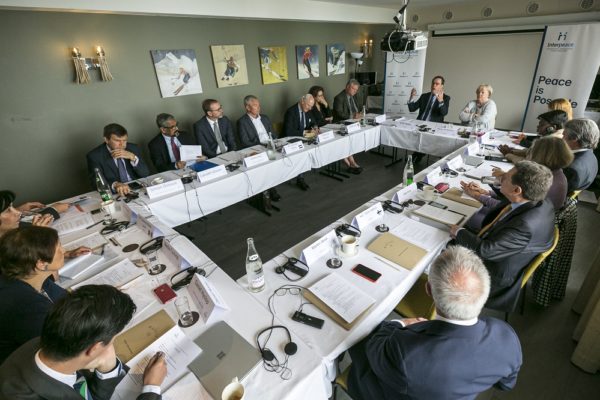
Photo Credits: Interpeace.
Ambassador Bhatia is Singapore’s Permanent Representative to the United Nations Office in Geneva et United Nations Office in Vienna, resident in Geneva. Ambassador Bhatia is concurrently Resident Representative to the International Atomic Energy Agency and Permanent Representative to the Preparatory Commission for the Comprehensive Nuclear-Test Ban Treaty Organization.
Ambassador Bhatia joined the Foreign Service in 1996 and has served in various capacities on issues covering Southeast Asia, Middle East and the United Nations in the Ministry’s headquarters. He served overseas as First Secretary in Singapore’s Permanent Mission to the United Nations in New York, from 1999 to 2003, and as an Alternate Representative for Singapore on the United Nations Security Council from 2001 to 2002. In 2006, he was appointed as the first Chargé d’Affaires in the Singapore Embassy in Doha, Qatar where he served until 2011.
He was Singapore’s Consul-General in Dubai from September 2011 to December 2012. Ambassador Bhatia was Singapore’s first resident Ambassador to the United Arab Emirates from January 2013 to December 2016. He served as Director-General Middle East, North Africa and Central Asia from January 2017 to May 2019. (Source: Ministry of Foreign Affairs Sigapore)
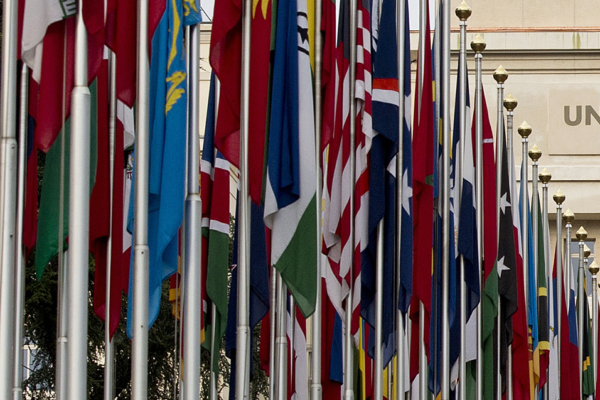
Photo credits: Interpeace.
Interpeace is delighted to announce that Elhadj As Sy has been appointed to join the Governing Board of Interpeace.
Mr. Sy gladly accepted the appointment, stating that “communities around the world are striving for peace to create an enabling environment for their health, development and wellbeing. It’s my privilege to join the Interpeace Governing Board and to contribute to its mission to make peace possible”.
Mr. Sy brings strong experience from decades of working in the humanitarian sector, including in numerous leadership roles. Most recently, from 2014 to 2020, Mr. Sy served as the Secretary General of the world’s largest humanitarian network – the International Federation of Red Cross and Red Crescent Societies (IFRC).
Previous roles include senior positions at the United Nations Children’s agency (UNICEF), the Joint United Nations Programme on HIV and AIDS (UNAIDS), The United Nations Development Program (UNDP)la Global Fund to Fight AIDS, Tuberculosis and Malaria, and The Environment and Development Action in the Third World (Enda Tiers Monde).
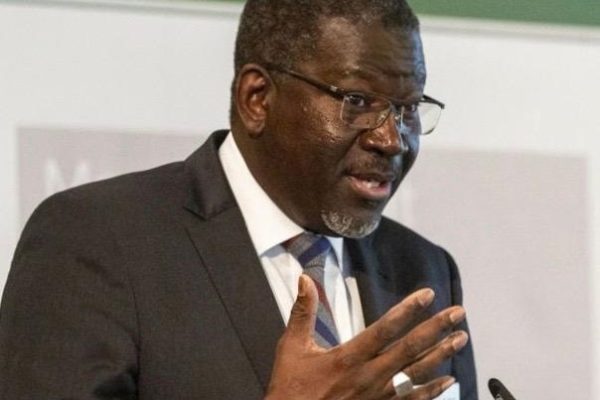
Photo credits: Interpeace, by Elhadj As Sy.
“In a world where humanitarian and development actors are struggling to secure the trust of affected communities, it is timely to welcome an outstanding humanitarian, such as Mr. As Sy, on to the Governing Board of Interpeace to enhance our peacebuilding efforts,” said the Board Chairperson, Monica McWilliams.
Mr. Sy is a member of the Global Commission on Adaptation, and, since 2018, has co-chaired the Global Preparedness Monitoring Board jointly convened by the World Health Organisation et World Bank Group. He is also a member of the Roll Back Malaria Board since 2016, Governor at Wellcome Trust, and Chair of the Kofi Annan Foundation Board since 2019.
“I am delighted to welcome Mr. Sy to Interpeace. His strong values, leadership experience and his commitment to protecting and enhancing the dignity of all people is truly inspiring,” said Interpeace President, Scott Weber.
Mr. Sy is a Senegalese national, also a graduate from the Vienna Diplomatic Academy, and speaks French, English, and German.
L' Interpeace Governing Board is made up of prominent individuals from the government, international, and business sectors. It is the highest decision-making body of the organization and plays a key role in defining Interpeace’s overall strategy.

Photo credits: Interpeace.
In response to the COVID-19 Pandemic, Interpeace has temporarily closed all offices worldwide, and all staff are working online. We have ceased all international and domestic travel by our staff and consultants, and we are not organizing or participating in large physical gatherings/events.
Interpeace staff have reviewed the full breadth of our peacebuilding work in the field as well as our peacebuilding policy projects. We have now made adaptations to ensure that all scheduled work in our 2020 annual workplan can still be delivered this year. We are in direct contact with our generous donors, partners and the communities we serve worldwide about how those adaptations are occurring. We are also appreciative for the support and commitment to new investment in Interpeace which has been extended to us even since the outbreak of the COVID-19 pandemic.
Planning is underway for the re-opening of our offices in due course, which will be in careful and full alignment with relevant World Health Organisation advice and also with local laws and regulations in the countries where each office is located.
Interpeace meanwhile remains in regular contact and consultation with our supporters and partners as the COVID-19 situation continues to evolve.

Photo credits: Interpeace by Antoine Tardy.
In 1994, the Genocide against the Tutsi in Rwanda claimed about 1million lives and left the country with the massive burden of overcoming this national trauma and building a fresh future.
The Chair of Interpeace’s Governing Board, Monica McWilliams, was in Rwanda recently and has spoken of her, ‘incredibly moving experience’ of visiting the Kigali Genocide Memorial.
In this video recording, issued today in remembrance of the Genocide against the Tutsi, Ms McWilliams says Rwanda is doing better in rebuilding from a genocidal history and fostering social cohesion. She also talks about how Interpeace is supporting the Government’s efforts in trauma healing in the country. “Rwanda is holding out the potential that we can move on,” Ms McWilliams says.
Watch video below:























